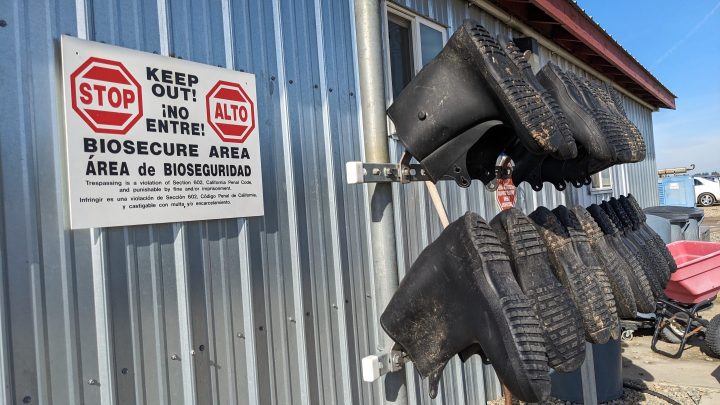
Bird flu has killed chickens and scrambled egg prices

Every day, outside a long, gray barn at California State University, Fresno, graduate student Brenda Hernandez Tapia walks over to a plastic bin full of protective equipment that many people might be accustomed to seeing in a hospital.
“The first step is putting on a pair of disposable plastic booties,” she said.
Then come coveralls, a hair net, a mask, gloves and a second pair of plastic booties. Lastly, she hoses off her double-wrapped feet with disinfectant.
“We try to make sure that nothing comes into our facility because there is a lot of birds we have to take care of,” she said.
Hernandez Tapia and other poultry science students raise chickens — 20,000 of them — from when they’re newborns to being sent off to poultry giant Foster Farms.
All those “biosecurity measures” help keep the birds free of disease, and that’s especially important now. The United States is two years into a massive outbreak of avian influenza, a virus sometimes referred to as bird flu.

Since early 2022, this deadly disease has killed more than 80 million birds, with the highest number of deaths reported in Iowa, Ohio and California. In central California, the outbreak has been particularly bad — more than 4 million birds have been lost in Merced County alone — and farmers, merchants and consumers are feeling it.
Fortunately for Hernandez Tapia, the virus has never reached the chickens at Fresno State. Hernandez Tapia monitors the birds for any sign of infection, like fatigue and nasal discharge similar to the runny noses that people with a case of the human flu can get.
The stakes are high. The disease is so contagious that, if one bird gets diagnosed, the entire flock has to be euthanized to prevent it from spreading. That’s led to empty coops across California and the nation.
Dr. Annette Jones, the state veterinarian at the California Department of Food and Agriculture, said this is one of the largest outbreaks she’s seen in two decades.
“We’ve lost 30% of the egg layers in the state in the past two months,” she said. “That’s a pretty big impact on farms.”
Farmers across the country have also lost millions of broilers — shorthand for chickens raised for meat — as well as turkeys, ducks and various backyard flocks.
The virus is spread mostly by wild birds, Jones said — especially through their droppings, which can contaminate waterways and be transported on shoes, clothing and vehicle tires.
“Some people have gone as far as to drain ponds, if they have them, during migratory season, to try and discourage ducks from landing,” she said.
Losing a flock sets a farm back months, though the government does compensate farmers for some of their losses. That helps keep workers on the payroll to disinfect coops.
Luckily, humans aren’t likely to catch this strain of bird flu. But it’s affected our grocery bills.
In 2022, the first wave of the outbreak killed off millions of egg-laying hens. That’s when the cost of a dozen eggs more than doubled. There’s also strong consumer demand for eggs. And although prices have since dropped a bit, they’re still higher than before the outbreak started.
In central California, grocery store customers have noticed — including Marylou Mendoza, who cooks for a residential youth facility in Fresno. She had three dozen eggs in her cart outside a FoodMaxx.
“We do breakfast sandwiches, we do scrambled eggs, we do chorizo and eggs, we do ham and eggs,” she said, but she now buys around half the eggs that she used to.
Further north, in Sonoma County, a million birds have been affected, including a commercial flock of 200,000 ducks. That’s affected Panizzera Meat Co. in Occidental, where cashier and butcher Madisen Adkins said duck meat has been hard to come by.
“Right at the beginning of January, we got one more order of duck breasts, and that was the last time we got anything,” she said.
The good news is that infected barns won’t be empty forever. Once they’re cleaned and inspected, farmers can begin to bring new flocks in. And soon, maybe egg prices can go back to being sunny side up.
Noah Abrams of Northern California Public Media contributed to this story.
There’s a lot happening in the world. Through it all, Marketplace is here for you.
You rely on Marketplace to break down the world’s events and tell you how it affects you in a fact-based, approachable way. We rely on your financial support to keep making that possible.
Your donation today powers the independent journalism that you rely on. For just $5/month, you can help sustain Marketplace so we can keep reporting on the things that matter to you.

















